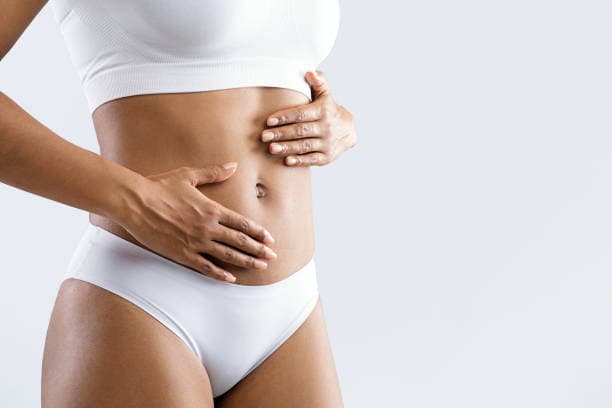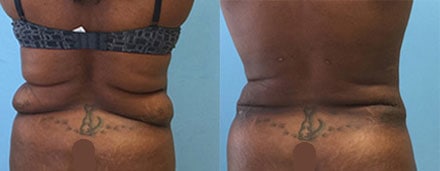An African American tummy tuck is tailored to the specific needs and wants of African American women and men. A tummy tuck, or abdominoplasty, can sculpt and enhance the contours of a woman’s body to create the profile she desires. Many African American women prefer a result that accentuates their beautiful curves.
Contents
Tummy Tucks Tailored to Your Tastes
Tummy tucks are highly personal aesthetic procedures. Different women have various ideal visions for themselves. Women should never feel they have to conform to whatever beauty standard is trendy or in-demand at the moment. All women should feel empowered to pursue their own vision of what makes them beautiful. An African American tummy tuck can enhance your natural beauty and help you achieve the hourglass shape of your dreams.
Dr. Saira H. Saini understands that beauty can mean different ideals for different patients. She possesses the training, experience, and eye for aesthetic details that allow her to craft a tummy tuck precisely to your vision. We honor all cultural heritages at Carolina Plastic Surgery and always strive to support your aesthetic goals.
If you’re curious how an African American tummy tuck might benefit you, reach out to Dr. Saini at Carolina Plastic Surgery by calling (910) 323-1234. You can also book an appointment online. We offer virtual consultations to accommodate your schedule and preferences.
About African American Tummy Tucks
Tummy tucks are incredibly popular procedures for women that have undergone changes to their bodies due to life events. Sometimes that means mothers who want some of their pre-pregnancy figures back. In other cases, patients who lost weight want to remedy the leftover skin that can’t be worked off through diet and exercise. Many patients simply want to remove excess skin.
What Makes an African American Tummy Tuck Different?
All tummy tucks remove unwanted skin and some fat deposits from the abdominal region while tightening the stomach muscles. However, different patients have different aesthetic goals. Many Caucasian patients desire a very slender and petite figure. Some Asian patients may want to enhance their curves. Latin American patients might request procedures to accentuate their buttocks. Typically, our African American patients want to celebrate their curves and create a more hourglass figure than our Caucasian patients who tend to prefer a more slender look. We want all our patients to look and feel great in whatever clothes they want to wear.
Benefits
- Tightens loose or weakened muscles
- Enhances the silhouette
- Creates more aesthetically pleasing body contours
- Removes excess fat and skin
- Crafts a flatter, more toned abdomen
- Potentially help resolve stress urinary incontinence
- Helps with posture
- Can help correct ventral hernias
One of the less known, non-aesthetic benefits of a tummy tuck is that it can help with medical issues such as stress urinary incontinence (SUI). SUI is an issue with bladder control that arises after giving birth for some women. A study of 250 patients who underwent abdominoplasty found that the tummy tuck procedure help alleviate the symptoms of SUI.[1]
African American Candidates
Ideal candidates for an African American tummy tuck are those with excess skin or pockets of fat around the abdomen that can’t be easily addressed through diet and exercise. Usually, the excess skin is loose or even sagging. Abdominoplasty is not a procedure for weight loss. It’s meant to address the stubborn remnants that can’t be worked off from diet or exercise. A tummy tuck can help contour the curves of the body in a way that pleases our African American patients.
Your Private Consultation in Fayetteville
Open and honest communication is of the utmost importance to everyone at Carolina Plastic Surgery. We want all patients to feel comfortable discussing any issues and concerns they might have in addition to opening up about their aesthetic goals and desires. You should feel comfortable asking any questions you might have about the tummy tuck procedure.

Dr. Saini focuses on a patient-centered approach to aesthetic procedures. As a field surgeon who has been on active duty deployment to Iraq and Afghanistan, she understands the importance of teamwork. She will work with you as your teammate to help you achieve the goals you set for yourself. She constantly strives to accomplish results that bring out your natural beauty.
Reach out to Dr. Saini today and book an appointment to discover how she can help you. You can call her Fayetteville office at (910) 323-1234 where we would be delighted to answer any questions.
How to Prepare
Follow all the individualized instructions provided to you by Carolina Plastic Surgery. The best way to prepare is by not deviating from these directions. If Carolina Plastic Surgery advises you to take or adjust certain medications, it’s extremely important to adhere to this. In general, you should stop smoking. Smoking always brings greater health risks, but especially before an involved surgery as it can disrupt your body’s natural healing. It’s important for you to not add any additional complications that might mar your results or increase your recovery period. We ask that you also abstain from anti-inflammatory medication including aspirin, Aleve, Motrin and ibuprofen.
The Procedure
Our tummy tuck procedures all follow a basic outline. The procedure will take between 3-5 hours.
- We supply the patient with the proper anesthesia.
- We mark the body with a surgical pen to ensure correct placement of incisions.
- Subtle incisions are made in the targeted region.
- Your surgeon repositions the naval.
- Your surgeon tightens the abdominal muscles.
- Loose and excess skin is removed.
- We reduce any stretch marks as needed.
- The incision is closed with the appropriate sutures.
The precise steps may vary depending on what type of tummy tuck you choose. These general styles of tummy tuck can be modified for African American patients based on individual preferences.
- High-tension – Tightens the abdominal muscles both vertically and horizontally to create a corset type result.
- Mini – Removes loose skin and excess fat and tightens just under the belly button.
- Fleur de Lys – Focuses on enhancing the abdomen after significant weight loss by removing excess skin and unwanted fat deposits along with muscle tightening.
- Traditional – Focuses primarily on the central abdominal area and provides a vertical tightening of the abdominal muscles, not horizontal. Excess skin and fat is removed.
- Male – Men don’t often request a corset look. For men, the abdominal muscles are tightened but not pulled inward.
One important distinction between a tummy tuck for African American women and a tummy tuck for women with a fair complexion is that black skin texture can sometimes be more prone to scarring and developing darker spots. When selecting a surgeon for a tummy tuck, African American women should verify the surgeon understands the differences between skin textures. Dr. Saini has performed many procedures on African American women and understands the potential for black skin texture to develop keloid scars.[2] The incisions may be placed differently to minimize any chance of scarring.
Recovery
The most important thing about recovering from a tummy tuck is giving your body the time it needs to properly heal. A tummy tuck is not a ‘lunch-time procedure’. You should take 1-2 weeks off from work after your surgery. Your body will need these weeks to heal. Find a relaxing hobby such as reading or catching up on streaming shows.
However, you don’t want to remain bedridden for those two weeks. It’s important to get up and begin to walk around the house as much as possible each day. Relaxed walking is great for the healing process as long as you don’t overdo it. It’s beneficial to enlist some trusted friends and family members to stay with you for a few days or at least check-in with you to ensure you don’t have to take on any strenuous activities. You will receive several follow-up appointments so we can monitor your progress during your recovery period. It can take 6-8 weeks before a tummy tuck patient can make a full return to all strenuous activities, so don’t rush your recovery!
Results
Tummy tucks regularly rank among the most popular cosmetic procedures in the U.S. Tummy tucks also receive excellent patient satisfaction ratings, with 96% of patients on Real Self stating the procedure was “Worth It”.[3] We offer world-class service and truly appreciate whenever patients update us on their aesthetic journey. We also thank every patient that has left us a review as they inspire us to continue doing our best.
Cost of Tummy Tucks in North Carolina
African American tummy tucks are not all performed in the same manner. Depending on each patient and the style of tummy tuck selected, the procedure can be more involved or less involved. A complete cost estimate will be provided during your consultation. We don’t have any hidden costs at Carolina Plastic Surgery. Financing options are available if you prefer to finance your treatment.
FAQ
Tummy tucks are designed to recontour the body to your desired specifications. They focus on tightening the skin and removing small deposits of excess skin and fat. Some thin patients can certainly achieve the results they want from a tummy tuck but its best to have a personal consultation to determine if you are eligible.
Due to the specifics of the tummy tuck procedure, if you’re BMI is over 30, it’s best to postpone the tummy tuck until you’re closer to your ideal body weight. Tummy tucks remove excess skin and redrape the remaining skin. This process is most beneficial on patients that will be maintaining a stable body weight afterward.
References
- Carruthers KH, Kocak E, Hulsen JH, McMahan JD. (2014). Improvement in stress urinary incontinence after abdominoplasty. Aesthetic Surgery Journal. 34(7):1091-1098. doi:10.1177/1090820X14544023
- Cooke, G. L., Chien, A., Brodsky, A., & Lee, R. C. (2005). Incidence of hypertrophic scars among African Americans linked to vitamin D-3 metabolism?. Journal of the National Medical Association, 97(7), 1004–1009. PMID: 16080671
- Tummy Tuck: What You Should Know. (2020, August 03). Retrieved August 07, 2020, from https://www.realself.com/tummy-tuck




